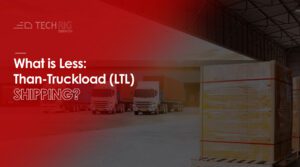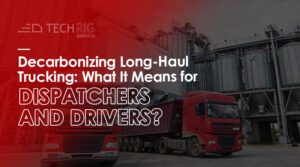Yes, if you’re looking to expand your service offerings and revenue streams without the complexity of trailer management. Power-only arrangements offer unique advantages for dispatch services willing to learn the specialized requirements. However, they’re not ideal for every dispatcher, as they require different operational procedures and client relationships than traditional full-service dispatching.
The decision involves weighing several factors: the unique requirements of power-only dispatch, the different business relationships involved, potential profitability, and whether your dispatch operation is properly positioned to serve this growing market. Unlike traditional dispatching, power only truck dispatching introduces different operational dynamics, paperwork requirements, and client expectations that might require adjustments to your existing business model.
What Does “Power-Only” Mean in Trucking?
In the trucking industry, “power-only” refers to a specific type of arrangement where a carrier provides just the tractor (power unit) and driver, while the trailer is supplied by the shipper, broker, or another transportation entity. Unlike traditional trucking setups where carriers provide both the tractor and trailer, power-only operations separate these components, allowing for more flexible logistics solutions.
The concept is straightforward: a carrier hooks up their tractor to a pre-loaded trailer, moves it to the designated destination, and then either drops the trailer or waits for it to be unloaded before returning it to a specified location. The carrier is responsible only for the transportation portion of the freight movement, not for providing the trailer itself.
For power only dispatch service providers, this arrangement introduces different dynamics compared to traditional dispatching. When working with power-only carriers, dispatchers focus on matching tractors with available trailer moves rather than securing loads for complete tractor-trailer combinations.
Pros of Power-Only Dispatch
Offering power only dispatch services comes with several distinct advantages that can benefit both your dispatch business and the carriers you serve. Here’s why many dispatchers are expanding into this specialized area.
Increased Market Opportunities
The demand for power-only transport has grown substantially as major shippers and logistics companies recognize its efficiency benefits. As a power only dispatcher, you gain access to freight opportunities that wouldn’t be available to traditional carriers who only accept full tractor-trailer jobs. This expanded market includes major retailers with private trailer fleets, intermodal operations, and companies with drop-and-hook systems.
Many large shippers prefer power-only arrangements because they maintain control over their trailers while outsourcing the driving component. This creates a steady stream of potential business for carriers who specialize in this segment. By offering power-only truck dispatching, you position your dispatch business to tap into these growing opportunities and diversify your revenue streams.
Simpler Equipment Requirements for Carriers
One significant advantage of power-only operations is the reduced equipment investment for carriers. Without the need to purchase and maintain trailers, carriers can operate with lower overhead costs and fewer maintenance responsibilities. This makes power-only work especially attractive for:
- New carriers looking to minimize startup costs
- Established carriers wanting to expand without investing in additional trailers
- Owner-operators focused on maximizing revenue while minimizing equipment expenses
When dispatching for power-only carriers, you can focus on connecting these tractors with companies that have trailer assets but insufficient power units to move them. This simplification of equipment needs creates a more streamlined operation for both the carrier and the dispatch service.
Operational Efficiency Advantages
Power-only operations often result in improved efficiency through reduced wait times and faster turnarounds. Since trailers are typically pre-loaded or ready for immediate pickup, drivers spend less time waiting for loading and unloading. This efficiency translates into:
- More miles driven per day
- Reduced detention time
- Faster completion of deliveries
- Increased earning potential for carriers
As a provider of these services, you can leverage these efficiency benefits when marketing to potential carrier clients. The promise of more drive time and less wait time is compelling for carriers focused on maximizing their road hours and revenue.
Cons of Power-Only Dispatch
Despite its advantages, providing power-only truck dispatching services also presents certain challenges that dispatchers should carefully consider before entering this market.
Specialized Knowledge Requirements
While power-only dispatch offers numerous benefits, it also requires specialized knowledge that differs from traditional dispatching. Offering dispatching for power only truck services means becoming familiar with:
- Trailer interchange agreements
- Different insurance requirements and liability considerations
- Specialized rate structures for power-only moves
- Unique operational procedures for drop-and-hook operations
This learning curve represents both a challenge and an opportunity. Dispatchers who master these specialized requirements can differentiate themselves in the market. However, it requires investment in education and system adjustments to properly manage power-only operations.
Different Business Relationships
Power-only dispatching often involves working with a different set of clients than traditional dispatching. Instead of dealing primarily with freight brokers, you might find yourself working directly with large retailers, intermodal companies, and logistics providers operating trailer pools. These relationships may require different approaches to negotiation, service agreements, and communication protocols.
More Complex Liability Considerations
When dispatching power-only moves, liability questions become more complicated since the carrier is handling equipment owned by another party. As a power-only dispatch service, you’ll need to understand how responsibility is divided for trailer damage, cargo issues, and accidents. This complexity can create additional administrative work and potential disputes if not managed properly.
How to Make Power-Only Dispatching Work for Your Business?
If you decide to enter the power-only market, several strategic approaches can help maximize your chances of success. Here are practical recommendations for dispatchers looking to build a viable power-only dispatch service:
Develop Specialized Expertise
Invest time in understanding the unique aspects of power-only operations, including:
- Trailer interchange documentation requirements
- Non-owned trailer insurance considerations
- Detention and delay policies specific to power-only moves
- Drop-and-hook operational best practices
This expertise becomes a valuable selling point when marketing your dispatch services to both carriers and clients with trailer assets. Position yourself as a specialist who understands the nuances of this transportation segment rather than a generalist trying to enter a new market.
Build Strategic Relationships
Success in power-only dispatching often depends on establishing the right business relationships. Focus on:
- Connecting with companies that maintain large trailer fleets
- Developing relationships with intermodal providers
- Networking with logistics companies that coordinate drop-trailer programs
- Building a roster of carriers specifically interested in power-only work
These relationships create the foundation for a sustainable power only dispatching operation. Many successful power-only dispatchers report that consistent, long-term arrangements with a few key clients prove more valuable than constantly chasing one-off power-only loads.
Implement Appropriate Technology Solutions
Power-only dispatching benefits from technology systems designed to manage its unique requirements. Consider investing in:
- Dispatch software with trailer tracking capabilities
- Digital solutions for trailer inspection documentation
- Communication tools that facilitate coordination between carriers and trailer owners
- Analytics that help optimize power-only operations
The right technology infrastructure supports efficient scaling of your power-only dispatch services while minimizing administrative complexity.
Start as a Hybrid Operation
Rather than immediately pivoting to an exclusively power-only model, consider a gradual approach. Many successful dispatch businesses maintain a mix of traditional and power-only services, allowing them to serve diverse carrier needs while testing the power-only market.
This hybrid approach reduces risk while providing valuable learning opportunities. As your dispatching for power only truck services mature, you can adjust the balance based on profitability, market demand, and operational efficiency.
Bottom Line
The decision to accept power-only clients ultimately depends on your specific business circumstances, goals, and resources. Success requires careful consideration of the operational adjustments, specialized knowledge, and relationship development needed to excel in this area. By starting with a small number of power-only arrangements, you can test the waters, develop expertise, and determine whether this specialization aligns with your business model before making larger investments or changes.
Tech Rig Dispatch offers top-tier power-only dispatch services, going beyond standard approaches to connect carriers with great opportunities in this growing niche. We’ve built strong relationships with major shippers nationwide, giving our carriers exclusive access to consistent, high-quality power-only loads you often won’t find elsewhere.
What makes us different? We really understand what both carriers and shippers need. We’re experts in the specific paperwork, insurance checks, and how power-only transport works. This means smoother processes and better profits for everyone.
Ready to explore the possibilities? Let’s talk about how we can power up your business!
read more
FAQs
What equipment do I need for power-only trucking?
For power-only trucking, you need only a tractor with the appropriate fifth wheel configuration, non-owned trailer insurance coverage, and proper connecting equipment. A power only dispatch service can help ensure you have the right setup before accepting your first power-only load.
How does payment work for power-only loads?
Payment typically follows a per-mile rate structure, though some contracts offer flat rates for specific routes. Rates often include compensation for trailer handling, waiting time, and deadhead miles. A specialized power only dispatcher negotiates these rates and ensures proper compensation for all aspects of the service.
Are there special insurance requirements for power-only carriers?
Yes, power-only operations require non-owned trailer coverage (typically $50,000-$100,000 per trailer) in addition to standard motor carrier insurance. When working with a power only truck dispatching service, they should verify that your insurance meets the requirements of potential clients.
How do I find reliable power-only loads?
The best sources include established relationships with companies operating trailer pools, contracts with major retailers, partnerships with intermodal providers, and specialized power only dispatch services with connections to these markets. The most consistent opportunities typically come through dedicated power-only channels rather than standard load boards.







